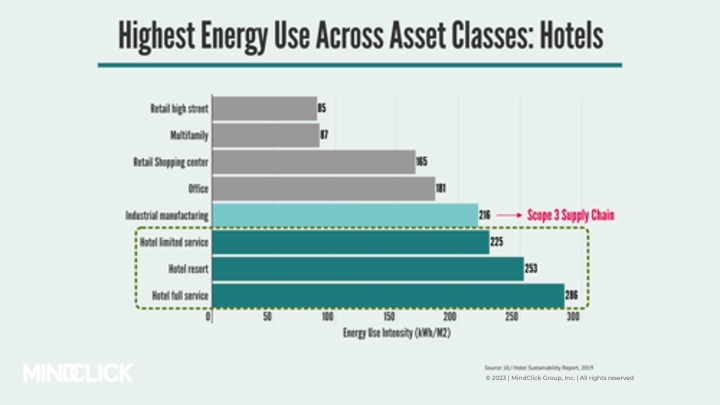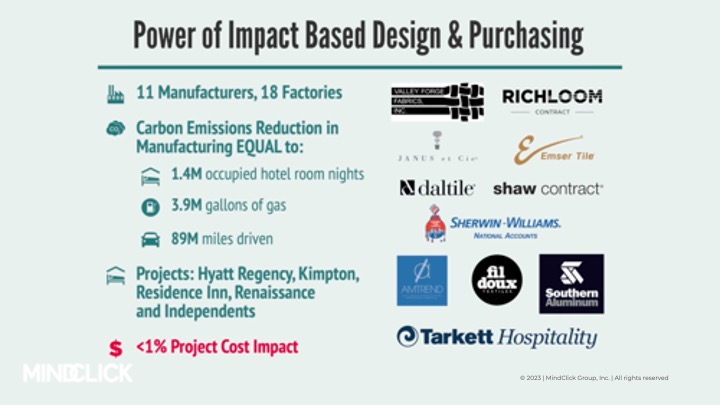Embodied Carbon Reductions: Hospitality Industry's Untapped Climate Opportunity


Synopsis
It's become essential for ESG reporting to include quantitative data that shows tangible progress in environmental and social areas. Hotels are uniquely positioned to not only contribute significantly to the reduction of global carbon emissions but also to benefit from more favorable capital conditions, enhanced asset valuations, and an increased market share. MindClick's Founder & CEO JoAnna Abrams firmly believes that embodied carbon reduction is the largest yet unexplored area for carbon reduction in the current market.
The disruptive impacts of climate change are being felt in every corner of the globe, and the hospitality industry is no exception. It’s not a hyperbole to suggest that the world’s estimated 187,000 hotels (representing roughly 17.5 million guest rooms) are at risk from the growing climate-related instability. Extreme weather events like wildfires, hurricanes, drought, and extended heat waves are affecting tourism and increasing operational costs. Further, climate-related supply chain disruptions are increasing risk across the industry. No location is immune to the effects of the changing climate.
ESG: Understanding Risk and Managing Resilience
As a result, the evaluation of risks associated with climate change are impacting hotel industry investment practices. Financial institutions, investments funds, and other sources of capital funding the design and construction of hotels are incorporating climate-risk into their evaluation criteria, impacting the cost of capital and valuations.
Starting in 2024, new EU rules will also require companies to disclose their impact on the environment, human rights, and social standards, and the US Securities and Exchange Commission is expected to announce new Carbon Related Disclosure Standards for publicly traded companies. Similarly, the state of California (4th largest economy in the world) recently passed the SB253 (The Climate Corporate Data Accountability) and SB261 (The Climate-Related Financial Risk Act) mandating large corporations disclose greenhouse gas emissions and other climate risks extending into their supply chains. With the increase in reporting requirements from the financial markets and from regulation, carbon emission reduction is becoming table stakes.
Positive Climate Action Through Embodied Carbon
These new ESG mandates present a unique opportunity for the hospitality industry. Hotels are part of the built environment, which contributes to 40% of global greenhouse gas emissions. A study by Urban Land Institute (ULI) shows hotels have the highest energy use across asset classes, and they rely on manufacturers in their supply chain to provide the products used to build, furnish, and supply their properties. With 80% of an organization’s carbon emissions coming from the supply chain, brands, owners and operators can make a powerful and positive impact in global carbon emissions reduction through the power of specification and purchasing decisions tied to building, furnishing, and supplying their hotels.
To date, most carbon reduction efforts in the industry have focused on operations. The less obvious and more challenging decarbonization efforts involve reducing embodied carbon
associated with buildings. Unlike other asset classes, the hospitality industry has a built-in business model requiring interior renovations every five to seven years.

Add to that a typical ownership cycle of 7 years and the commonly associated renovation that comes from new ownership. Combined with new construction, this makes a for a high volume of interior furnishings, fixtures and equipment going in and out of hotels throughout the industry on an annual basis. While recognition of the waste impact is high, the impact of carbon emissions was unknown until a study from the Carbon Leadership Forum and LMN Architects was published showing how after 5-7 interiors renovations, the embodied carbon of the interiors equals, if not exceeds, the architecture and structure’s embodied carbon.
Data-driven Product Intelligence & Project Integration: A Solution to Understanding Impact
At MindClick, a product intelligence company, we have developed a proven, data-driven, breakthrough solution that measures and tracks product-level, carbon emissions reductions in manufacturing connected to the purchasing decisions on hotel brand standards and design and construction projects. First, we bring together all stakeholders at every level of the value chain and empower them with data about the environmental and social impacts associated with the products being considered for projects. Ultimately, this enables teams to make informed design and purchasing decisions that align with sustainability and ESG goals.
For our clients – investors, operators, and brands – we track the environmental and social impact of project decisions through each phase, and provide them with quantified, impact reports summarizing achievements across 4 KPIs: carbon reduction, waste reduction/circularity, healthy interiors, and social responsibility – DEI and Fair Labor & Human Rights. The aggregated results are then included in ESG reporting, and brand and property marketing to consumers, corporate travel buyers and hotel guests.
Power of Impact-Based Design & Purchasing
MindClick analyzed the embodied carbon reductions achieved across five of our clients’ renovation projects -- Hyatt Regency, Kimpton, Residence Inn, Renaissance and Independents. The impact was significant and compelling. The products purchased for these projects from 11 manufacturers and their 18 factories achieved carbon emissions reductions in manufacturing equal to:
- 5 million occupied hotel room nights or
- 9 million gallons of gas or
- 89 million miles driven.
Our clients were able to create beautiful and sustainable interiors with zero to negligible cost increase (less than 1%), and by sourcing products from vendors who reduced their factory carbon emissions, our clients’ capex dollars directly contributed to reducing the drivers of the industry’s greatest challenge - climate change.
ESG & Telling The Sustainability Stories: A Market Opportunity & ROI
Hotel performance is being measured in a new way, and ESG reports evaluated by the financial market are directly affecting access to capital, risk and resilience strategy and asset valuation. An investor survey conducted by Cushman & Wakefield in 2022 confirmed a 4.5% - 7.3% value premium for assets with the highest ESG credentials.
A value-add to our approach is helping our clients translate complex sustainability data associated with their supply chain decisions. We turn what we call Product Intelligence into powerful and relatable narratives that connect sustainability initiatives with the values driving buying decisions among an increasingly climate-conscious consumer market. According to the 2022 Expedia Group Sustainable Travel Study, 90% of customers now look for sustainable options when traveling.
The impacts of good sustainable storytelling help build brand loyalty as well. A guest satisfaction survey conducted by MindClick for a Courtyard Marriott renovation found a 150% increase in guest satisfaction and loyalty among those who were made aware of interior furnishings that support healthy environments.* For the business travel industry, which represents a large revenue source for hotels, an evaluation of sustainability metrics is now a key consideration in their buying decisions. In 2023, the Global Business Travel Association (GBTA) published a study on “The State of Climate Action in Business Travel”, and the results are telling:
- 65% of corporate travel buyers said that carbon emissions reduction was a top priority.
- 75% said companies are teaching employees to make sustainable travel choices.
- More than 60% said that they either already select or plan to select hotels based on their sustainability criteria and are adding sustainability clauses into contract.
Bottom line
Quantitative data demonstrating real environmental and social progress is now an imperative for ESG reporting. There is a tremendous opportunity for hotels to not only make a significant reduction in global carbon emissions, but to access more favorable capital, realize increased asset valuations, and gain market share. I’m more convinced than ever that embodied carbon represents the biggest “untapped” source of carbon reductions in the market today. The brands, owners and operators who take on the challenging task of reducing carbon emissions in their supply chains–and tell a compelling story about it–will be the winners.

* Based on results of digital marketing campaign and guest satisfaction study conducted for Marriott International. Quotes pulled from MindClick’s research participants.